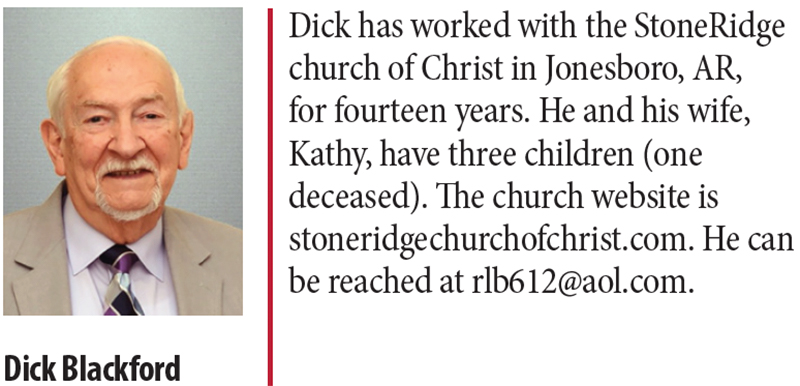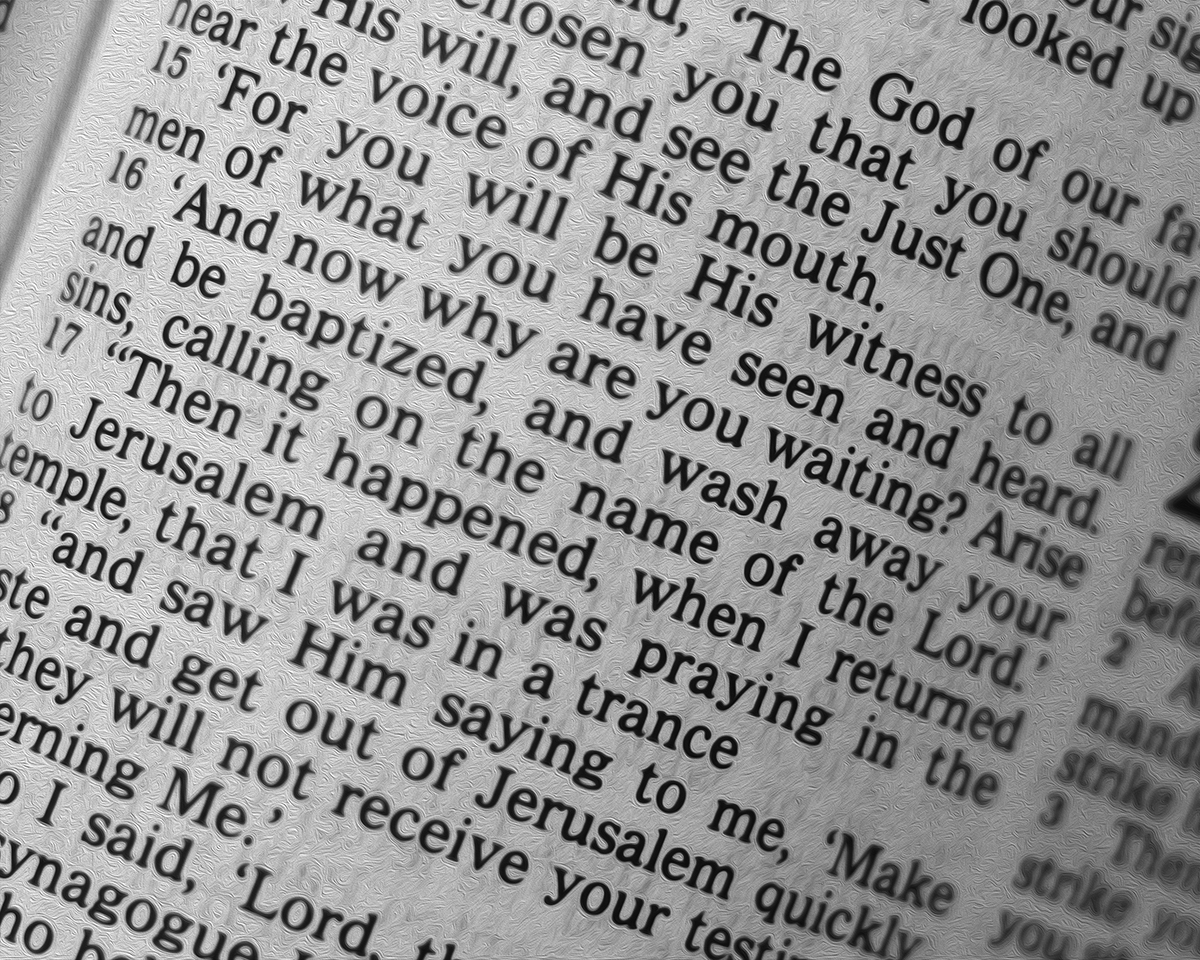by Dick Blackford
Synopsis: Will you be like the scribes and Pharisees who rejected God’s purpose (regarding John the Baptist and Jesus Christ), or be counted among those who acknowledge God’s justice by submitting to Christian baptism?
Although Christ and His apostles settled this issue, it remains unsettled in the eyes of men. In this article, let us consider and refute three errors.
When someone makes this statement, they usually quote Ephesians 2:8-9, which says, “By grace are ye saved through faith, and that not of yourselves, it is the gift of God, not of works lest any man should boast.” Yet, notice some things said about baptism:
(1) Jesus likened it to a “birth” (John 3:3-5). Ask any new mother, “Who does the work when a birth takes place?” She does! If it’s a work, it’s not the work of the one being born.
(2) Paul called baptism a “burial” (Rom. 6:4; Col. 2:12). Ask any grave digger, “Who does the work of performing a burial?” If it’s a work, it’s not the work of the one being buried.
(3) Baptism also involves a “resurrection” (Rom. 6:5; Col. 3:1). When Lazarus was raised from the dead, he was the beneficiary of divine grace. Moreover, he was helpless to get out of the grave clothes. Jesus had to command, “Unbind him and let him loose” (John 11:44). If resurrection is a work, it isn’t the work of the one being resurrected.
Since baptism is a birth, a burial and a resurrection, none of which a person does for himself, then baptism is the thing least likely to be called a “work.” Maybe that’s why the Bible never identifies it as such. If one insists on calling it that, at least call it a work of God, for it originated in God’s mind, not man’s. Thus, man is not in a position to boast. Neither should he discount it as a work of righteousness. Peter himself said, “But in every nation whoever fears Him and works righteousness is accepted by Him” (Acts 10:34-35). On the day of Pentecost, Peter commanded baptism for the remission of sins (Acts 2:38; cf. 10:48). He also said it “saves” (1 Pet. 3:20-21). He saw no contradiction in boastful works on the one hand, and obedience to God’s commands on the other.
Jesus said, “Except (unless, NIV) one is born of water and the Spirit, he cannot enter into the kingdom of God” (John 3:3-5). We can neither “see” nor “enter” the kingdom without it. That makes it extremely important. Can we afford to misunderstand?
Some have argued that “water” refers to physical birth and “Spirit” refers to spiritual birth. Imagine telling someone who has already been born physically that “unless you have been born physically, you can’t enter the kingdom.” It would be beyond redundant to tell a person that he needs to do something that already happened and can’t be repeated. Those who want “water” to refer to physical birth make the same mistake Nicodemus made. “How can a man be born when he is old? Can he enter a second time into his mother’s womb. . .” (John 3:4)?
Yet, where Nicodemus got it right and others get it wrong is that he understood Jesus to be talking about the birth of a man, not a baby. Jesus said that one must be born “again.” The person who has already experienced a physical birth (i.e., everybody) must be born again of water and the Spirit. Never was Jesus talking about physical birth. It was Nicodemus who injected that idea, and he was talking about the birth of “a man when he is old” (John 3:4). Yet, how can we be sure?
First, baptism involves a “newness of life”—a birth (Rom. 6:4) in which one is baptized “into Christ” (Rom. 6:3). “If any man be in Christ, he is a new creature”—a birth (2 Cor.5:17). So, “newness of life” and becoming a “new creature” occurs at baptism when one is born again. It harmonizes perfectly with the King’s statement, “Except one is born anew he cannot see the kingdom of God.”
Second, when the Samaritans “believed Philip preaching good tidings concerning the kingdom of God. . . they believed and were baptized. . .” (Acts 8:12).
First, what is there about preaching the kingdom of God that would cause them to want to be baptized? Let the King of the kingdom answer: “Except one is born of water and the Spirit, he cannot enter into the kingdom of God” (John 3:5). Salvation rides on that answer. The Samaritans made a connection between hearing the preaching of the “kingdom of God” and the need to be baptized. Where would they have gotten such an idea? Philip preached what the King said about entering the kingdom! That’s a necessary implication. You cannot enter the kingdom without it, said the King.
Second, what is it about preaching “the name of Jesus Christ” that would cause them to want to be baptized? When the apostles healed the lame man, Jewish authorities asked, “By what power or in what name have you done this?” Peter and John replied, “in the name of Jesus Christ of Nazareth, whom you crucified. . .” In verse 12, Peter said, “Nor is there salvation in any other, for there is no other name under heaven given among men by which we must be saved.” Earlier on Pentecost, Peter said baptism “in the name of Jesus Christ” was “for the remission of sins” (Acts 2:38). That would be a really good reason to be baptized in the name of Jesus. Peter should know, for it was the King who gave Peter the keys of the kingdom (Matt. 16:18-19).
The Samaritans made the connection and were baptized. People today need to make that same connection, or they will miss the kingdom. Jesus also said, “He that believes and is baptized shall be saved. . .” (Mark 16:16). The Samaritans did this (Acts 8:12). You can too.
Those who make this affirmation quote Paul, who said, “For Christ sent me not to baptize, but to preach the gospel. . .” However, that’s not the same as saying “baptism is no part of the gospel.” The statements don’t mean the same thing. Paul, himself, obeyed the command to “Arise and be baptized and wash away thy sins” (Acts 22:16; cf. 9:18). When Paul said he wasn’t sent to baptize but to preach, he was talking about the physical act of baptizing. If baptizing is no part of the gospel, why did he baptize Crispus, Gaius, and the household of Stephanas? Although Jesus baptized more disciples than did John, He didn’t perform the physical act, but rather His disciples did (John 4:1-2). So likewise, Paul’s primary work was preaching, while others could do the baptizing.
Why would Paul baptize anybody if it’s not essential? Because Jesus connected baptism to the gospel: “Go into all the world and preach the gospel to every creature. He who believes and is baptized will be saved; but he who does not believe will be condemned” (Mark 16:15-16).
Jesus wants an RSVP from us. Preaching the death, burial and resurrection of Jesus will not avail unless one knows how to respond. If he believes and is baptized, he “shall be saved.” Verse 16 is telling us the response he expects from one hearing the gospel. However, if the response is not contained in the gospel, how would one know how to respond? Jesus settled this a long time ago. Hear ye Him!


